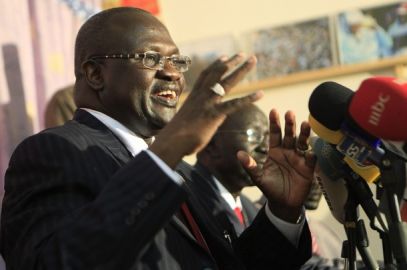Machar to lead national mobilisation committee on border conflict with Sudan
April 27, 2012 (JUBA) – South Sudan’s cabinet on Friday endorsed the formation of a national mobilisation committee in response to the border conflict with Sudan and appointed the vice president, Riek Machar, to lead and coordinate the nation-wide efforts in facing the “aggression” from its northern neighbour.

The vote was in a accordance with a 2005 peace deal that gave South Sudanese the right to self-determination, which they took in a referendum in January 2011.
Many parts of the peace deal were not implemented and agreements have not been made to enable post-partition adjustment, such as a deal over oil transit fees to allow landlocked South Sudan export its crude oil and for Sudan to recover from the loss of 75% of its oil production.
Heglig, one of the few remaining oil fields left in Khartoum’s control after South Sudanese independence, was captured and occupied by the South Sudanese army (SPLA) on 10 April in response, Juba said, to unprovoked attacks against its territory by the Sudan Armed Forces (SAF).
In response to international pressure, the SPLA pulled out on 20 April. SAF deny that the exit was voluntary and claim they took back control of Heglig through force.
Military recruitment and deployment of assets has been stepped up on both sides of the border.
Sudan’s government has also formed a committee led by Sudanese First Vice President, Ali Osman Taha, to mobilise the people of Sudan to prepare for the possible eventuality of all out war.
South Sudan on Tuesday laid out the ground work for the formation of a mobilisation body, saying the border conflict necessitated a robust mobilisation of both human and material resources.
On Friday the Council of Ministers discussed the security situation and resolved to form a national mobilisation committee under the chairmanship of the vice president with membership of the heads of all the political parties, civil society organisations, local NGOs, business community and the bicameral national parliament and 10 key relevant national ministers.
The national coordination committee will oversee the mobilisation of the population and establish effective coordination mechanisms with the various national groups and states committees.
This will include recruitment into the army of youth volunteers and ex-combatants.
It will also enlighten the population about the South Sudan’s perspective on the history and causes of the border conflict with Sudan as well as assist in diplomacy and attempt to inform the international community about the issues of conflict.
Machar has admitted that South Sudan has done a poor job explaining its position on Heglig to the world and the country was widely condemned for occupying the area. UN chief Ban Ki-Moon went as far as to say that Juba’s actions were illegal.
The meeting also called on institutions responsible for information and media outlets in the country to step up efforts in reflecting the nature of the border conflict with Khartoum.
Machar on Thursday accused Khartoum of misleading the world with incorrect maps which illegally annexed several disputed territories along the border.
He said Khartoum was not interested in peace and that this explained why the Sudanese government pulled out of the African Union-sponsored negotiations in Addis Ababa, warning that Bashir’s attitude was geared towards invading South Sudan.
He called on the international community, particularly the United Kingdom, to intervene and apply its historical knowledge of Sudan as a former colony and assist in demarcating the borders between the two countries as they stood in 1956 when the British left the country.
However, Machar added that should Khartoum not heed to the international calls to stop aggression against South Sudan, the new nation will defend itself and liberate the border territories.
(ST)
